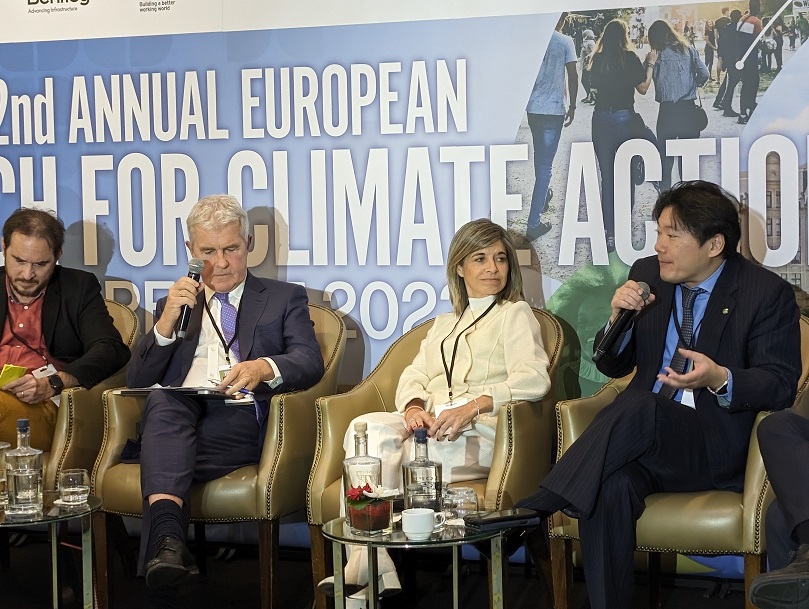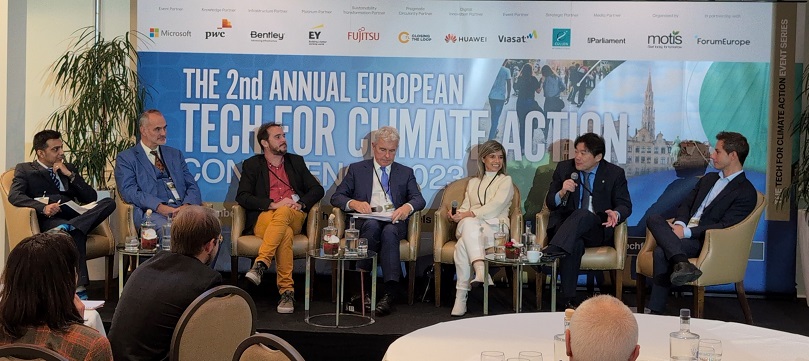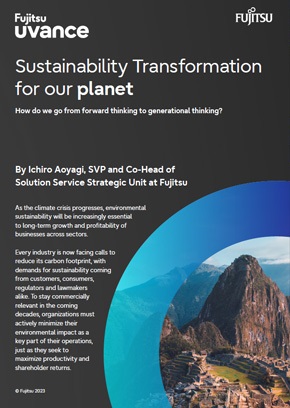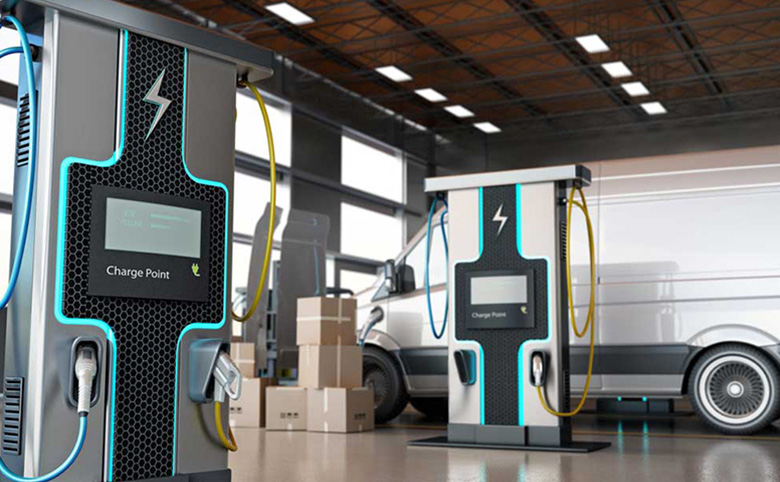Being bolder: Why leaders must drive Sustainability Transformation to address the climate emergency

Article|2023-12-14
9 minute read
The climate crisis is already having a severe impact on humanity—and this will only get worse, unless we take action, fast. This must be a collective priority for policymakers and leaders across the private and public sectors.
Fujitsu’s Ichiro Aoyagi recently spoke at the European Tech for Climate Action Conference in Brussels. In this article he shares three key insights from the event on technology innovation, collaboration, and building confidence in change.

The warmest year on record, 2023
The impact of climate change is undeniable. It is the single greatest challenge facing humanity.
As we learned in a new report from the UNEP this month (*1), in September 2023 average global temperatures were 1.8°C above pre-industrial levels. This year is almost certain to be the warmest on record.
We are already witnessing the effects of this warming, with extreme weather events, wildfires, flooding, and much more. Both the human and economic costs are immense. To build a sustainable, prosperous future, climate action must be our top priority.
As the UNEP report indicates, some progress is being made. When the Paris Agreement was signed in 2015, forecasts showed emissions increasing 16% by 2030 – this forecast has now fallen to 3%.
Yet we need to move faster. To limit global warming to 2°C, emissions must fall by 28% by 2030. And to limit warming to 1.5°C, they must fall by 42%.
There is an alarming lack of certainty in our plans to achieve these reductions. As we heard at the EU Tech for Climate Action conference in Brussels earlier this month, the EU faces a 50bn € funding gap to achieve its 2030 decarbonisation goals. We must take collective action to close this gap, reduce emissions and preserve our planet for generations to come.
I was privileged to speak on a panel at the event exploring the role of Artificial Intelligence (AI) to support the EU’s climate goals. It was also inspiring to hear from policymakers, business leaders, and technologists on other areas where technology is helping us address the harms of climate change.
Since the event, I have reflected on the top insights we heard that will help business leaders in their organizations’ journeys to sustainability transformation.
(*1) UNEP. “Emissions Gap Report 2023.” UN Environment Programme. November 20, 2023.
https://www.unep.org/resources/emissions-gap-report-2023.
Embrace technology innovation as an enabler for Sustainability Transformation
One of the most powerful insights shared by several speakers was the potential of technology to enable holistic transformation. There are gains to be made through using technology for incremental improvement, prediction, process optimization, and maintenance – all can indeed help to reduce emissions.
However, the greater benefit lies in using technology to drive deeper changes in our organizations.
As we heard during the AI panel discussion, there is an imperative to use tools such as AI to transform how we do things and help to mitigate climate impact. For example, AI-enabled design could allow us to reduce the weight of manufactured goods, with a commensurate reduction in emissions throughout their lifecycle. Changing the way we do things today can help us limit the impact on our ecosystem.
We also heard how AI, data, and analytics have a role to play in policymaking itself. By empowering policymakers with tools to support their work, it enables them to judge the likely impact of interventions – and indeed, to discover positive impacts beyond what they imagined.

The same is true for all organizations. The technology of today gives us a unique opportunity to make better decisions for tomorrow – provided we use it effectively.
Rightly, there is much concern about the environmental impact of technology itself. Datacenters, networks, storage, servers; all use energy, and all create a carbon footprint throughout their operational lifecycle. How can we justify this?
We need to be clear on how digitization can enable emissions reductions across all industry sectors – particularly carbon-intensive industries such as agriculture, transport, and energy. As we heard at the event, according to one theory, digital technologies can reduce carbon emissions in these sectors by up to 15%, if properly used and governed.
Then there is also a responsibility on technology companies – such as Fujitsu – to decarbonise and innovate the technology itself. Whether developing more energy-efficient processors, powering datacenters with 100% renewable energy, or using AI to optimize production efficiency; all allow us to deliver more capacity with less impact on the planet.
Collaboration is crucial to action
Another theme at the conference was the importance of collaboration. The climate emergency is bigger than any single organization or nation – we must work together to drive action.
One particularly important area of collaboration is between governments and policymakers and the private sector. Clearly, regulation and compliance is an essential tool to drive change. However, there is a risk that regulation lags behind the pace of innovation, and unforeseen consequences can hinder progress.
Several of the speakers also identified the need for large enterprises to more effectively collaborate and embrace the innovation that small to medium enterprises (SMEs) can bring. Often smaller organizations can achieve transformation and decarbonization in a faster, more agile way. To accelerate our collective progress on climate action, it is essential that disruptive SMEs can unlock the funding to scale within a vibrant innovation ecosystem.
Collaboration depends on data. Many of the panellists agreed on the challenges faced in establishing a consistent view of data to support climate action. Often different organizations, even within the same nation, will measure emissions in different ways, using different terminology, and different technology systems.
This presents a fundamental challenge to assessing and taking action on Scope 3 emissions – which may account for more than 70% of an organization’s carbon footprint.(*2)
Again, progress is being made to solve these challenges with projects such as Catena-X, an open data ecosystem with a focus on sustainability for the European automotive manufacturing industry.(*3)
We must collectively accelerate adoption of data projects such as this to meet our climate action goals.
(*2) UN Global Compact Network UK. “Scope 3 Emissions.” 2023.
https://www.unglobalcompact.org.uk/scope-3-emissions/.
(*3) Catena-X Automotive Network e.V. “Catena-X Your Automotive Network.” 2023.
https://catena-x.net/en/.
Build confidence in change
Even small changes within an organization can be daunting – and the scale of the changes we need to make in response to the climate crisis are immense. Leaders must address the fear of change to build confidence and trust in their sustainability transformation journey.
This is particularly true around emerging technologies that have great potential for disruption, such as AI. As I commented during the panel session, it is vital for leaders to establish pilot programmes to rapidly validate and test the potential of new technologies. By starting small, and fast, organizations can build confidence without excess risk.
Leaders must also challenge their organizations, partners, and suppliers to ensure that their data value chain can be trusted. We cannot rely on recommendations from AI if the underlying data is biased, inaccurate, or incomplete. Having full confidence in data is essential to build support and collective action towards change.
And this same trust must be earned by the technology itself. Even if the data is reliable, many current AI technologies work on a “black box” model where there is no assurance or explanation of how it has reached its results.
When it comes to climate action, or any important decisions that could affect peoples’ lives, this is not good enough. We must be able to explain and justify decisions that are made supported by tools such as AI, to build confidence amongst business and societal stakeholders.
To build a sustainable future for their organizations, their societies, and our collective humanity, leaders must embrace the potential of technology innovation. Not only to optimize existing business models, but to develop and unlock entirely new models of value creation that work in harmony with our planet.
Transforming the way our organizations operate, empowered by technology and innovation, is the only route to addressing the climate emergency whilst maintaining prosperity and economic growth.
Ichiro Aoyagi
SVP / Co-Head of Solution Service Strategic Unit, Fujitsu
Ichiro Aoyagi joined Fujitsu Limited in 1998, after working at Matsushita Electric Industrial Co., Ltd. (now Panasonic). In April 2020, he assumed the position of Head of the Digital Experience Platform Business Unit, launching data businesses such as data analytics and blockchain. From April 2022, as Vice Head of Fujitsu Uvance Unit, he led initiatives aiming to solve social issues globally. He has held his current position since April 2023.

Sustainability Transformation for our planet
How do we go from forward thinking to generational thinking?
Unlock business growth with environmental sustainability in our expert report by Fujitsu SVP Ichiro Aoyagi.


You may like
Planet:
Solving global environmental issues

Fujitsu Uvance: Where technology meets sustainability

15% CO2 emission reduction in charging EVs: Data collaboration is key

